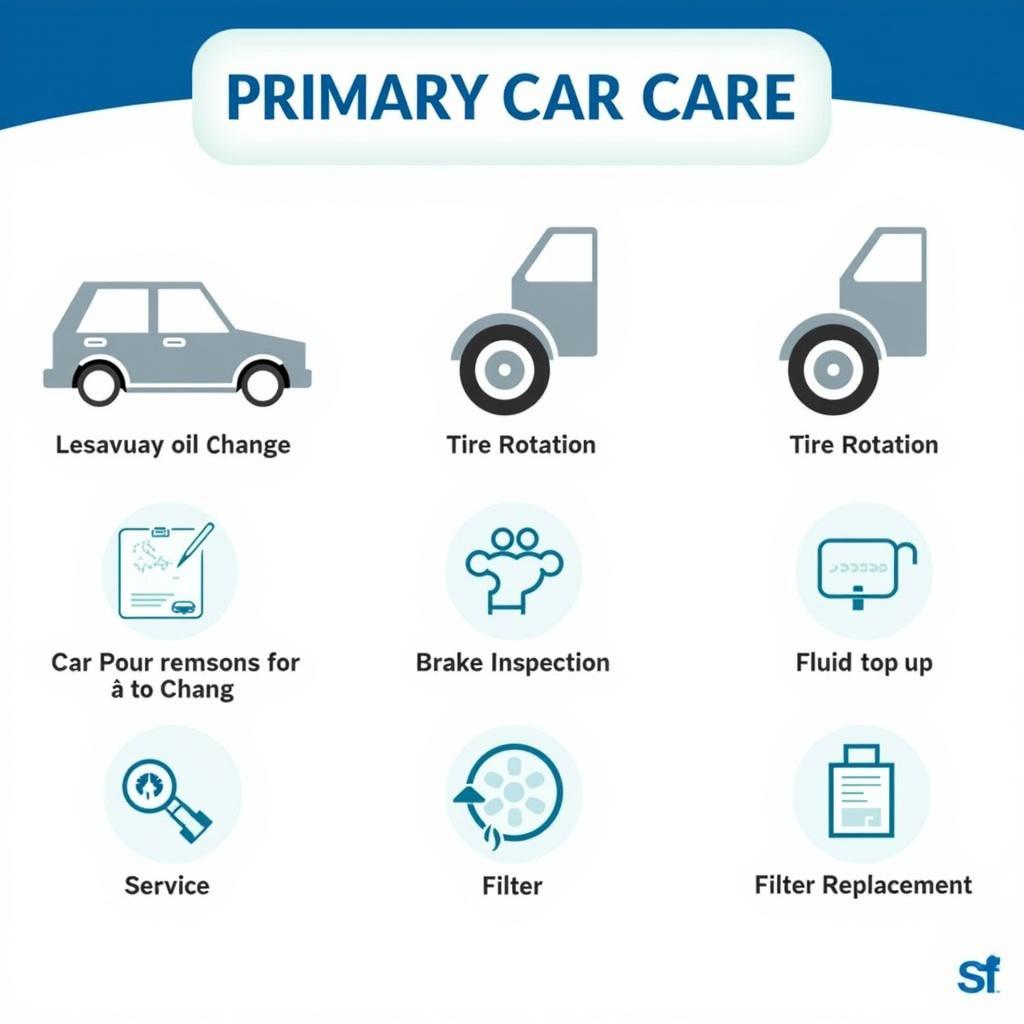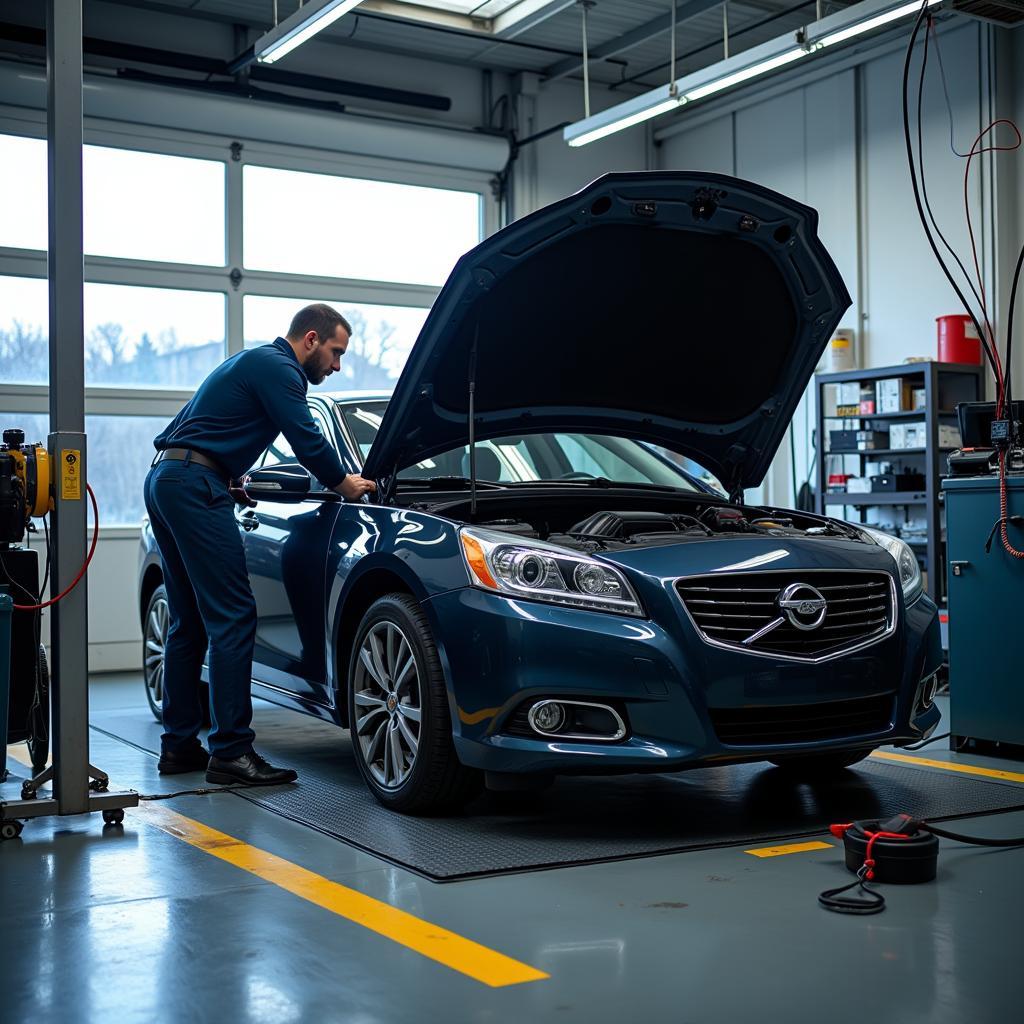What are Primary and Secondary Care Services?
When it comes to your car’s well-being, understanding the different levels of car care is crucial. Just like our own health, cars require a range of services to stay in top condition. Let’s dive into the key differences between primary and secondary care services for your vehicle.
Primary Car Care: Your Car’s Regular Check-Up
Think of primary car care as the foundation of your vehicle’s health. These are the essential, routine services that keep your car running smoothly and prevent minor issues from escalating into major problems.
What services fall under primary care?
- Regular Oil Changes: The lifeblood of your engine, regular oil changes ensure proper lubrication and prevent excessive wear and tear.
- Tire Rotations & Pressure Checks: Maintaining optimal tire pressure and rotating them periodically ensures even wear, extending their lifespan and enhancing fuel efficiency.
- Brake Inspections: Your brakes are crucial for safety. Regular inspections ensure they are in good working order and any potential issues are addressed promptly.
- Fluid Top-Ups: From coolant to transmission fluid, various fluids keep your car running smoothly. Regular top-ups prevent overheating, component damage, and costly repairs.
- Filter Replacements: Engine air filters and cabin air filters keep dirt and debris from entering your engine and your car’s interior, respectively. Regular replacements ensure optimal performance and air quality.
 Essential Primary Car Care Services
Essential Primary Car Care Services
Why is primary car care so important?
- Preventive Maintenance: Regular servicing catches minor issues early on, preventing them from developing into costly repairs down the line.
- Enhanced Safety: Maintaining your car’s essential systems like brakes and tires is paramount for your safety and the safety of others on the road.
- Improved Performance: A well-maintained car performs better, offering smoother handling, better fuel economy, and a more enjoyable driving experience.
- Increased Resale Value: A car with a documented history of regular maintenance is more appealing to potential buyers, increasing its resale value.
Secondary Car Care: Specialized Treatment for Your Car
While primary care focuses on routine maintenance, secondary car care deals with more specialized services, often addressing specific issues or components.
Examples of Secondary Car Care Services:
- Engine Diagnostics & Repair: When your check engine light flashes or your engine exhibits unusual behavior, specialized diagnostics are needed to pinpoint and address the problem.
- Transmission Repair & Service: Your car’s transmission is a complex system. Secondary care services address issues like slipping gears, rough shifting, or fluid leaks.
- Electrical System Repair: From faulty wiring to malfunctioning sensors, secondary care professionals diagnose and repair issues within your car’s electrical system.
- Air Conditioning Service: Keeping your car cool during hot weather requires specialized attention to the AC system, including refrigerant recharge, leak detection, and component repair.
- Suspension & Steering Repair: If you experience a bumpy ride, pulling to one side, or unusual noises while steering, specialized attention to your suspension and steering system is needed.
 Car undergoing diagnostic check
Car undergoing diagnostic check
When do you need secondary car care?
- Warning Lights: Illuminated dashboard warning lights, such as the check engine light or ABS light, often signal a need for secondary care.
- Unusual Sounds or Smells: Any unusual noises, vibrations, or burning smells emanating from your car should be checked by a professional.
- Performance Issues: Experiencing problems with acceleration, braking, steering, or overall vehicle performance warrants a visit to a qualified mechanic.
- Accident Damage: After an accident, it’s crucial to have your car thoroughly inspected and repaired by professionals to ensure its structural integrity and safety.
“Secondary car care is about addressing specific concerns as they arise,” says John Smith, Senior Automotive Technician at XYZ Auto Repair. “Regular maintenance through primary care can certainly minimize the need for these services, but having a trusted mechanic to diagnose and repair complex issues is essential for every car owner.”
Primary vs. Secondary Car Care: Working Together
Think of primary and secondary car care as two sides of the same coin. While distinct, they work in tandem to ensure your car remains in optimal condition:
- Primary care focuses on preventing issues and maintaining overall vehicle health through routine service.
- Secondary care addresses specific problems, often utilizing specialized knowledge and equipment for diagnostics and repairs.
Conclusion
Understanding the difference between primary and secondary car care empowers you to make informed decisions about your vehicle’s maintenance. By prioritizing primary care services and seeking professional help when specialized attention is needed, you can extend your car’s lifespan, enhance its performance, and enjoy a safer and more enjoyable driving experience.
Remember, a well-maintained car is a happy car!

